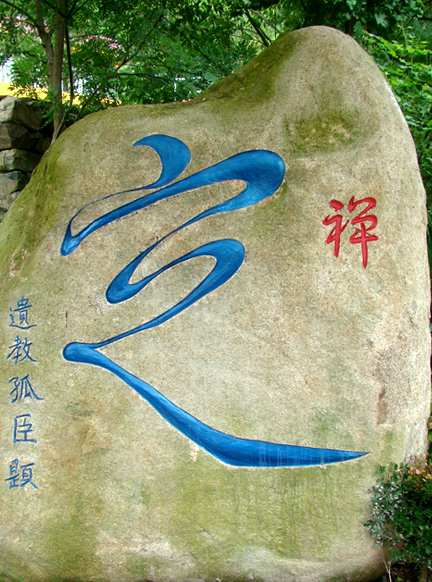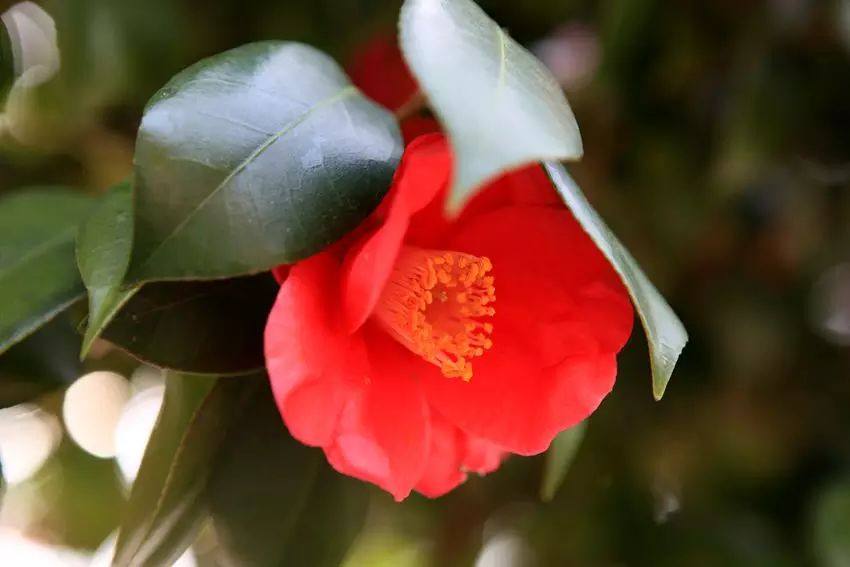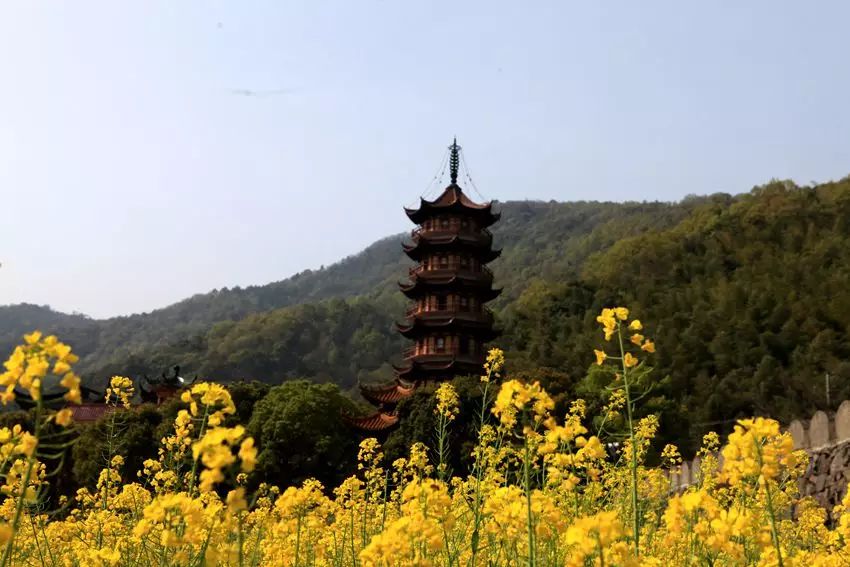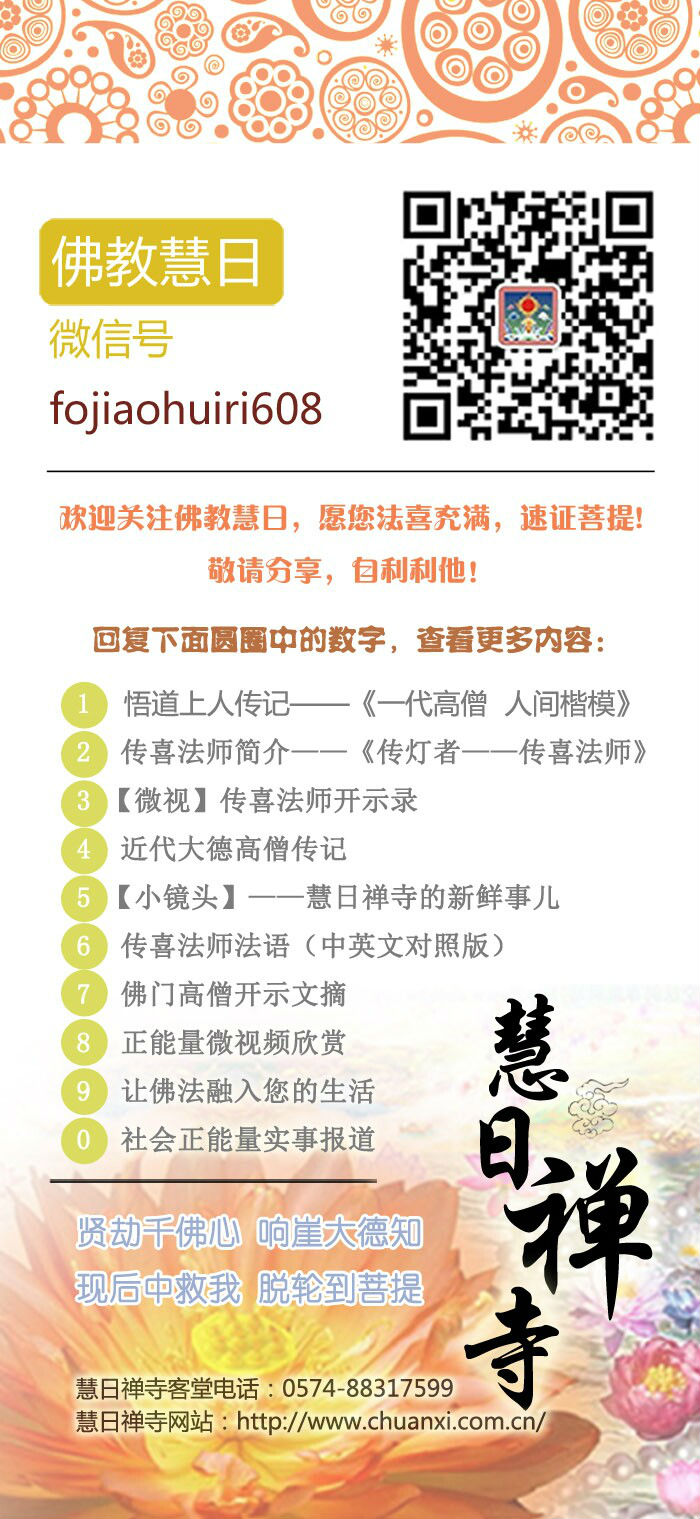80岁老教授的来信:《现 代 和 尚——传喜法师》(一) Master Chuanxi ——A Modern Monk

宁波效实中学的语文特级教师冯中杰老先生,近日托薛老师送来一封信,信打开是一篇读后感。虽然老先生不是一个佛教徒,但是老先生的这篇文章却能够帮助人们纠正对佛教的一些偏见……
近日读了薛老师赠我的《钵水云影》。《钵水云影》是宁波慧日寺当家和尚传喜法师弘法讲稿的汇编。传喜法师1967年出生于上海,1994年在新昌大佛寺披剃,2002年开讲《楞严经》,2003年受邀担任慧日寺住持。法师弘法不辞劳瘁,十多年来足迹遍及祖国大陆、港澳台、东南亚、欧美等世界各地,深受信众的欢迎和敬仰。我不是信徒,只能用凡人的眼睛阅读。读后最大一个感触:传喜法师是个了不得的现代和尚。

从15岁到80岁,我去过的寺庙不少,见过的和尚甚多,但与之交谈过的却只有三个。第一个在上世纪50年代初。那时我在嘉兴中学读书。一日放学回家,墙门里人说,王家二姐和精严寺当家和尚结婚了。精严寺我熟悉,就在我读过的湖光小学斜对面,读小学时常去玩,一是寺庙大,二是香火旺盛,三是庙里师父(那时对和尚的通称)和气,从不赶我们。精严寺还办有小学,规模不大,专供缴不起学费的穷人家孩子就读。王家二姐就是庙里小学的老师。小学老师二姐和当家和尚结婚,这着实让人惊奇。
日子一久,事情的来龙去脉有点清楚了。精严寺原有很多庙产(田地),现在没了,香火也断了,难以为继,年轻的和尚都还了俗。当家和尚是后生,是能人,他还俗后进了嘉兴最大的工厂—民丰造纸厂,先是车间操作,不久坐进了写字间。同墙门里的人,一来二去,也就熟悉了。我曾问他为什么出家?他说家在山区,穷,很小就进了庙。不识字怎么办?师父教读经,读经就是识字。佛经学得多不多?不多,师父只教读应用做佛事的。师父年纪大,让我当家,日常事务繁忙,心静不下来。你说天上真的有菩萨吗?你信就有,你不信就没有。他话不多,有问必答,待人诚恳。我初中毕业后,到湖州读师范。放寒假回到嘉兴,家里人说,那个二姐夫死了。怎么死的?民丰着火,他在救火中受重伤,死在医院里。他是个好人,墙门里的人都这样称道他。

第二个在1958年,我读大四。由学校安排,我们去临安天目山地区学农,为期三个月。学农期间,我们班登了一次西天目山。农民说,登顶,来回需两天,中间有座庙可歇脚。我们仗着年轻,披星上山,戴月归来,只用了一天。途中,在庙里歇脚。庙里只一个和尚,四十来岁,他也因为家里穷困,从小出家。问他现在念不念经,他说旧时上山拜佛人多,吃穿不愁,每天按规矩做功课。现在没了香火,为生存每天劳作,或种植,或采摘,天一黑人就累得坐不住,也为省灯油,早早睡了,还能念什么经。
第三个在八十年代,普陀山梵音洞景区,和一个从嘉兴来的“打工和尚”谈过天。他说他已退休,到普陀山看管梵音洞,为改善生活。梵音洞离普济寺远,地方偏僻,夜里就他一个人。问他念不念经,他说东南亚华侨香客来拜佛,就念一些,有红包,有外块,特高兴。夜里一个人时,就听听录音机或半导体。我是半个嘉兴人,他对我格外亲近,让我参观他房间。他房间里吃的东西不少,却无半本经书。问他念经功课还做不做?他说退休了,不工作了,功课自然不做了。给普济寺打工,任务是看管梵音洞,没有佛事上的要求。
拿上述三个出家人和传喜法师作比较,传喜法师的现代性就凸显出来了。
(1)三个出家人,头顶都有戒疤。嘉兴精严寺的还俗和尚,虽然蓄了发,戒疤也隐约可见。传喜法师顶门光亮,没有经历烧洞的苦难。有戒疤的都说,有菩萨保佑,不痛,这是骗人的,烧戒时,含泪强忍着,一辈子也不会忘记。1983年起,中国僧人不再烧戒疤,这是个合乎人情的改革。我总觉得,在中国做和尚不容易,规矩比印度、日本、东南亚多。但一旦成了规矩,要改也难。我希望再有些改革。
(2)我交识的三个和尚,都学过佛经,但不广不深,停留于应对香客和做佛事的需要。传喜法师则可称之为佛学专家了。传入中国的佛教是大乘。大乘分显宗、密宗,藏传佛教属于密宗。中国和尚懂显宗又懂密宗的,可能不多,传喜法师在显密两领域里都能往来自如,游刃有余,实为难得。汉传佛教约有两千年历史(佛教传入中国,一说汉哀帝元寿元年即公元前2年,另一说汉明帝永平十年即公元67年),印度的大乘到了中国逐步中国化,产生了有中国特色的许多宗派,影响大的有四个,天台宗、华严宗、净土宗、禅宗。宁波天童寺属曹洞宗,是禅宗一个支派。各宗派都有自己的当家佛经,如天台宗的《法华经》,华严宗的《大方广佛华严经》,净土宗的《无量寿经》。经书不容易读,讲经弘法更为不易,而传喜法师对各派的当家经书都有钻研,都能宣讲。传喜法师弘法,有深入浅出的特点,像我这样的凡人也能轻松的阅读。譬如说“大乘”,法师说,大乘就是大巴,众生都可以乘在这部车子里。大乘大慈大悲,普度众生,爸、妈、小孩、猫狗也是。大乘车里常住的是三宝,佛、法、僧,众生皈依三宝,从生死大河的此岸到达菩提涅槃的彼岸,这就成就了佛果。再譬如说“八关斋戒”,法师说,“关”,关闭恶趣;“斋”,清净;“八”,用八种方法;“戒”,就是解脱。法师说,我们也在搞生命科学,也在克隆,戒是佛的身体,把佛的八条戒文取下来,放在你心灵试管里,就克隆出圣者、克隆出佛。在世界上已克隆了两千多年,一批批凡夫因持戒而获解脱。法师又说,用戒律来作防盗门、防盗窗,不让贪嗔痴贼来偷你自家本有的宝贝。法师又说,出家人戒条有250条,俗称“二百五”,这二百五可不是傻瓜,是智者。这样说佛法,即使是文盲也能够听明白。传喜法师确是弘法的高手、智者。
宁波效实中学语文特级教师
正教授级中学高级教师
冯中杰

A highly reputable retired teacher of Ningbo Xiaoshi Secondary School, Mr. Feng, has senta letter through Teacher Xue. Although Mr. Feng is not a Buddhist, he hopes that this letter will help to rectify some people’s biasness against Buddhism.
Recently, Ifinished reading a book called, “The Shadow of Cloud on Water in an Almsbowl”,which was gifted to me by Teacher Xue. This book contains a collection of Dharma teachings by the highly respectable Master Chuanxi, the current abbot of Huiri Temple at Ningbo. The master was borned in Shanghai in the year 1967. He was ordained as a monk at Grand Buddha Temple in 1994. In 2002, the master gave lectures on “Shurangama Sutra” and was invited to be the abbot of Huiri Templea year later. For more than a decade, Master Chuanxi has been travelling restlessly across

From the age of 15 till 80, I have been to many temples and met many monks. I only know three monks in my entire life. Thefirst monk whom I met was in the early 1950s. At that time, I was still a student studying at Jiaxing Secondary School. Oneday on the way home, I heard people talking about the marriage between the second daughter of Wang Family and the abbot of Jingyan Temple.I knew every corner of the temple because it was just opposite my primary school and I used to play in the temple with my friends after school. Many people went praying at the temple and it was quite big. The monks were very friendly and never asked us to leave. The temple also set up a small primary school to provide free education for poor children. The second daughter of Wang Family was one of the teachers of that school and it was a shock to us that she got married with the abbot of the temple.
Due to the news about the abbot’s marriage, the Buddhists stopped going to the temple and the younger monks also gave up their monkhood. The temple once owned a lot of properties and now it was all gone. Onthe other hand, the abbot found a job at Minfeng Paper Factory, the largest factory in Jiaxing at that time. He started working at the workshop and was transferred to the administration department later due to his capability. Iasked him why he had decided to become a monk. He said that he used to live in mountains and his family was very poor. So, the only choice for him was to become a monk. He did not know how to read. His master taught him how to recognise Chinese characters through reading the Buddhist sutras. I then asked him if he had learned many sutras. He said he learned only a few, just enough to handle Buddhist events. As his master got older, he was asked to take over the temple from his master. He had been very busy with daily matters at the temple and never had any chance to let his heart settle down. I asked if hereally believed in the existence of Bodhisattvas. He said the Bodhisattvas only existed if you believed in it. He was a sincere and humble person but would answer any question that you asked. After graduating from my junior secondary school, I joined teachers training programme. In one of the winter vacations, I went home and people told me that the ex-abbot of Jingyan temple had passed away. How did it happen? He was caught in a fire that broke out at the paper factory and was trying to save others. He was seriously injured and died in the hospital. People thought that he was a good man.
I met the second monk in 1958 when I was in my final year of undergraduate study. We were sent to a mountainous region of Linan to learn about agriculture for three months. During that time, we climbed up to the westof Mount Tianmu. Usually it takes two days to reach to the top of the mountain. However, we were young and energetic then, itonly took us a day to complete the mission. Half way through the journey, we stopped by at a temple to take rest. There was a monk in the temple who looked like over 40. Again, he told us that he became a monk since a very young age due to poverty. I asked if he still kept reciting sutras as part of his practice of Buddhism. He said that he used to follow the practice before because there had been many disciples praying at the temple and had given plenty of offerings.Now, there was no one here to provide offerings. So, he basically had to work very hard to grow vegetables to feed himself. By the time the sun set, he would be so tired that sleep was the only thing that he needed. Moreover, he would save some money if he slept early as he did not have to light up the oil lamp inthe night. He gave up reading the sutras.
The third monk that I met was in 1980s at Mount Putuo who also came from Jiaxing and worked as a caretaker of Fanyin Cave. He came here to‘work’ as a monk after retirement to improve his living condition. The cave was located at a remote place far from Puji Temple (a famous sitefor pilgrims). He was all alone by himself in the night. When I asked if he still recited sutras, again his answer was not promising. He said he would only recite a little when there were pilgrims from South East Asia who would give him ‘hongbao’ (red packets with money). He said that he was very happy to earn extra bucks as the rewards of reading the sutras! Since he was alone in the night, he would listen to the radio for leisure. He was very friendly to me since I had spent some years studying in his hometown before. He showed me his room. I saw lots of food but could hardly see any sutras. He also told me that he did not have to spend time reading sutras since it was not a required job function and he was only ‘hired’ as acaretaker of the cave.If we make a comparison between the above mentioned monks and Master Chuanxi, we can easily distinguish the respectable master’s unique qualities.
1.It used to be a tradition in
2. All three monks that I met before had learnt very few sutras and their understanding mainly remained at superficial level. Master Chuanxi, on the other hand, could be regarded as an expert in Buddhism. Mahayana Buddhism was brought into the mainland
Master Chuanxi’s style of preaching is to explain the profound sutras in simple language. Even for anordinary person like me could understand it easily. For example, he described‘Mahayana’ as a big bus where all beings could take a ride on it. All beings refer to parents, children, dogs, cats etc. The key characteristics of Mahayana Buddhism are great compassion and the will to save all sentient beings from sufferings. There are three jewels in this great vehicle of Mahayana namely the Buddha, the Dharma and the Sangha. By taking refuge in all the three jewels, itis possible to cross the big stream of births and deaths from this side of the river bank to the other side, the bank of Nirvana. This means to achieve the state of Buddhahood.
Another example is about the eight commandments that the master explained. Through the practice of the eight commandments, it closes the door to evil reincarnations as animals,hungry ghosts and hell beings. ‘Eight’ means eight ways to purify our souls and lead us to the liberation from the six realms of samsara. He also said that:“We are exploring the science of life and living through ‘cloning’. By following the eight commandments and placing them in the test tubes of our souls, we are actually trying to clone the sages and the Buddha. For over two thousand years in the history of humankind, we have successfully ‘cloned’ many of them and they achieved enlightenment eventually.” The master also said that the commandments serve as the burglar-proof doors and windows. The purpose is to prevent the three thieves (greed, anger and ignorance) from stealing the natural treasure that we all possess. All these examples prove that Master Chuanxi is a sage and an expert of preaching Dharma. Even an illiterate personwould be able to understand his teaching.
 爱出者爱返,福往者福来。随喜转载,功德无量。
爱出者爱返,福往者福来。随喜转载,功德无量。
